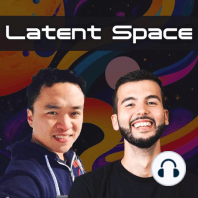52 min listen

Doing it the Hard Way: Making the AI engine and language ? of the future — with Chris Lattner of Modular
Doing it the Hard Way: Making the AI engine and language ? of the future — with Chris Lattner of Modular
ratings:
Length:
89 minutes
Released:
Sep 14, 2023
Format:
Podcast episode
Description
Want to help define the AI Engineer stack? Have opinions on the top tools, communities and builders? We’re collaborating with friends at Amplify to launch the first State of AI Engineering survey! Please fill it out (and tell your friends)!If AI is so important, why is its software so bad?This was the motivating question for Chris Lattner as he reconnected with his product counterpart on Tensorflow, Tim Davis, and started working on a modular solution to the problem of sprawling, monolithic, fragmented platforms in AI development. They announced a $30m seed in 2022 and, following their successful double launch of Modular/Mojo? in May, have just announced their $100m Series A.While the performance claims of Mojo? and its promise as a fully multithreaded compiled Python superset stole the show, we were amazed to learn that it is a side project - and the vision for Modular’s Python inference engine is at least as big.Listeners will recall that we last talked with George Hotz about his work on tinygrad and how he wants to replace PyTorch with something faster and lighter, handwriting a “reduced instruction set” of operators himself. But what if the problem could be solved at even lower level - with the Python engine/runtime itself?Chris on CompilersChris’ history with compilers is well known - creating LLVM during his PhD (for which he won the 2012 ACM Software System Award), hired straight into Apple where he also made Clang and Swift (the iPhone programming language that replaced Objective-C), then leading the Tensorflow Infrastructure team at Google where he built XLA, a just-in-time compiler for optimizing a lot of the algebra behind TF’s workloads, and MLIR, a modular compiler framework that sat above LLVM to optimize ML graphs and kernels that were hard to represent in the LLVM IR. So as pretty much the best compiler engineer in human history, you’d justifiably assume that Chris is simply choosing to take his compiler approach to Python. And yet that is not how he thinks about compilers at all. As he says in our chat,“How do you enable invention? How do you get more kinds of people that understand different parts of this problem to actually collaborate? And so this is where I see our work on Mojo and on the engine……I don't have a compiler hammer that I'm running around looking for compiler problems to hit.”Today a small number of people at companies like OpenAI spend a lot of time manually writing CUDA kernels. But an optimizing compiler for AI leads to compilers as a means to an end for increasing software collaboration, expanding the ability of people with different skillsets and knowledge.“…What is the fundamental purpose of a compiler? Well, it's to make it so that you don't have to know as much about the hardware. You could write everything in very low-level assembly code for every single problem that you have… But what a compiler really does is it allows you to express things at a higher level of abstraction.”For Chris, compilers are also ways to properly automate generalized optimizations that might otherwise be manually coded and brittle abstractions, like operator fusion:“So NVIDIA goes and they build this really cool library called FasterTransformer. The performance point of using it is massive. So a lot of LLM companies and other folks use this thing because they want the performance.…Here's the problem. If you want to go innovate in transformers, now you're constrained by what FasterTransformer can do, right? And so, again, you come back to where are compilers useful?They're useful for generalization. If you can get the same quality result or better than FasterTransformer, but with a generalized architecture, well now you can get the best of both worlds, where you have orthogonality and composability, you enable research, you also get better performance.”Done correctly, these operator optimizations being implemented at the compiler level amount to an “AI Engine” that can not only survive, but enable major archit
Released:
Sep 14, 2023
Format:
Podcast episode
Titles in the series (67)
ChatGPT, GPT4 hype, and Building LLM-native products — with Logan Kilpatrick of OpenAI by Latent Space: The AI Engineer Podcast — Practitioners talking LLMs, CodeGen, Agents, Multimodality, AI UX, GPU Infra and all things Software 3.0